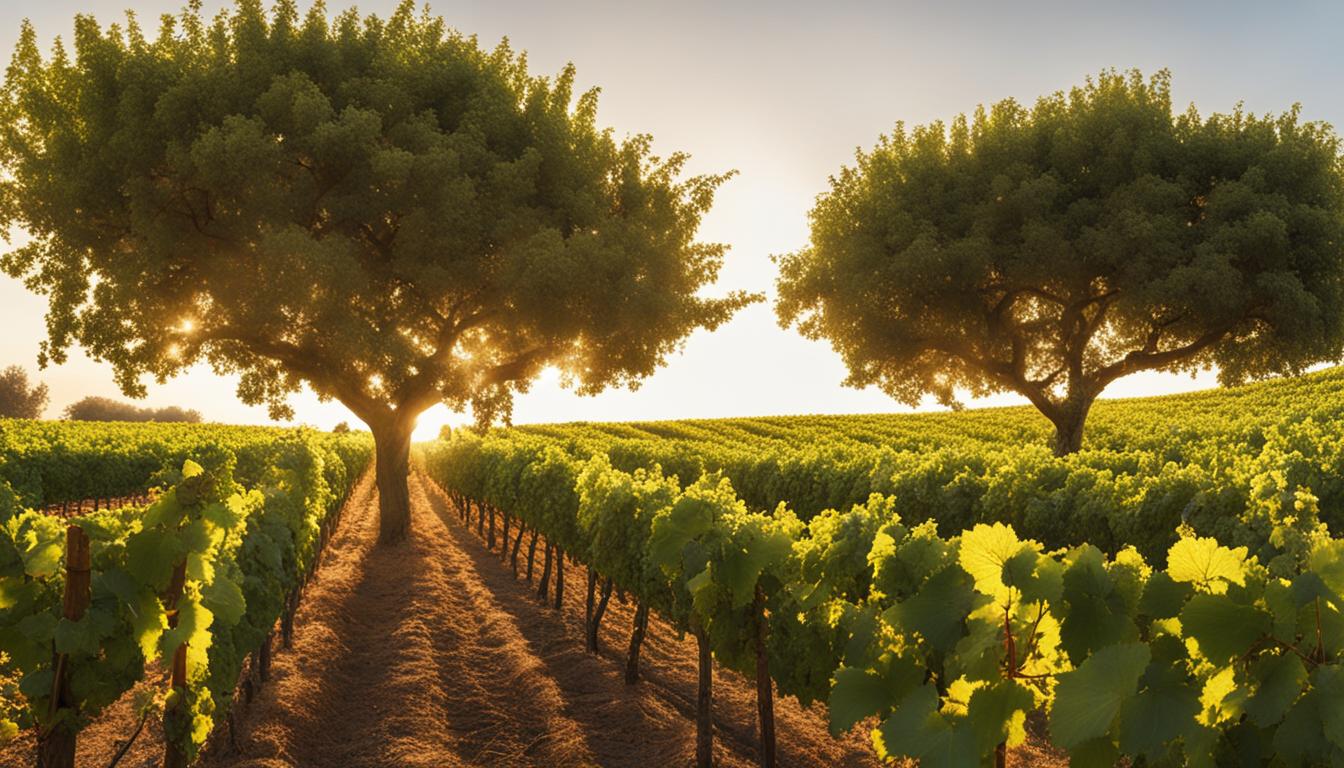The vineyard holds significant symbolism in the Bible, representing the people of God and their relationship with Him. Throughout biblical passages, the vineyard is used as a metaphor to portray God’s chosen nation, Israel, as well as the care and love God has for His people. However, the vineyard also highlights their sin and rebellion when they produce wild grapes, emphasizing the need for repentance and obedience.
In this article, we will explore the various references to the vineyard in the Bible, including its representation in Isaiah 5 and Jesus’ parable in Matthew 21. We will also delve into the spiritual symbolism of the vine and branches, as well as its significance in the early Christian community. Additionally, we will examine the vineyard’s association with wine and its role as an agricultural metaphor.
By understanding the biblical meaning of the vineyard, we can deepen our spiritual understanding and gain insights into God’s care, faithfulness, and the consequences of rebellion.
Key Takeaways:
- Vineyard symbolizes the people of God in the Bible.
- In Isaiah 5, the vineyard represents Israel and highlights their rebellion.
- Jesus uses the vineyard metaphor in his parable in Matthew 21 to emphasize the need for new leadership.
- The vine and branches metaphor in John 15 emphasizes spiritual growth and pruning.
- Vineyard represents God’s care, preservation, and judgment.
The Vineyard in Isaiah 5
One of the most famous uses of the vineyard symbolism in the Old Testament is found in Isaiah 5. In this passage, Isaiah recounts the song of the vineyard, where the vineyard represents Israel and the owner represents God. Despite God’s loving care for his vineyard, it yields only wild grapes, symbolizing the disobedience and rebellion of the people. This passage serves as a warning to Judah, urging them to turn away from sin and to do God’s will. However, the bleak language used in the song of the vineyard reflects little hope for a positive outcome.
The vineyard of the Lord Almighty is the nation of Israel, and the people of Judah are the vines he delighted in. And he looked for justice, but saw bloodshed; for righteousness, but heard cries of distress.
To illustrate the unfaithfulness of Israel, Isaiah employs a vivid metaphor of a vineyard that fails to produce good fruit despite the owner’s painstaking care. The owner represents God, while the vineyard symbolizes Israel as God’s chosen people. The disappointment expressed in this passage emphasizes the consequences of rebellion and serves as a call to repentance.
The vineyard imagery in Isaiah 5 offers a sobering reminder of the need for individuals and communities to align themselves with God’s will and turn away from sin. It reveals the depth of God’s love and care for his people, as well as the sorrow that comes from their disobedience. This powerful symbolism underscores the importance of faithfulness and obedience in maintaining a fruitful relationship with God.
The Vineyard in Jesus’ Parable in Matthew 21
In Matthew 21, Jesus tells a parable about a vineyard that further illuminates the symbolism of this powerful imagery. The parable begins with a landowner who plants a vineyard and rents it out to tenants. When the landowner sends his servants to collect the produce from the vineyard, the tenants mistreat and even kill them. Finally, the landowner sends his son, thinking that the tenants will respect him. However, the tenants seize the opportunity to kill the son and take possession of the vineyard.
This parable holds significant meaning in the context of Jesus’ ministry. The landowner represents God, the vineyard represents Israel, and the tenants symbolize the religious and political leaders of Israel. The servants sent by the landowner represent the prophets who were rejected and persecuted by the people. Finally, the landowner’s son is a clear reference to Jesus himself. The parable foreshadows Jesus’ crucifixion and reveals the leaders’ rejection of him.
The parable highlights the unfaithfulness and disobedience of the religious leaders and the need for new leadership. It emphasizes that God’s people will be guided by the risen Jesus, who has authority over the vineyard. This parable serves as a warning to the religious leaders of Jesus’ time and carries a timeless message for all who seek to follow God faithfully.
“Therefore I tell you that the kingdom of God will be taken away from you and given to a people who will produce its fruit.” – Matthew 21:43
Table: Key Symbolic Elements in the Parable of the Vineyard in Matthew 21
| Symbol | Meaning |
|---|---|
| Landowner | God |
| Vineyard | Israel |
| Tenants | Religious and political leaders of Israel |
| Servants | Prophets |
| Son | Jesus |
Vineyard in the Psalms: A Symbol of Hope
The vineyard imagery is not limited to the prophet Isaiah or Jesus’ parables. It also appears in the Psalms, particularly in Psalm 80. This psalm beautifully depicts the vineyard as a powerful symbol of Israel’s origin as God’s people and their ongoing struggles and need for God’s care and protection.
In Psalm 80, the vineyard represents God’s chosen nation, Israel, and their relationship with Him. The psalmist cries out to God, asking Him to restore and revive the vineyard, which has been devastated by enemies. The vineyard imagery highlights the continuous love and faithfulness of God to His people, even in times of defeat and exile. It serves as a reminder of God’s enduring commitment to His chosen ones and the hope of restoration and renewal.
Restore us, O God of hosts;
let your face shine, that we may be saved!
You brought a vine out of Egypt;
you drove out the nations and planted it.
You cleared the ground for it;
it took deep root and filled the land.
The mountains were covered with its shade,
the mighty cedars with its branches.
It sent out its branches to the sea
and its shoots to the River.
Why then have you broken down its walls,
so that all who pass along the way pluck its fruit?
The boar from the forest ravages it,
and all that move in the field feed on it.
Turn again, O God of hosts!
Look down from heaven, and see;
have regard for this vine,
the stock that your right hand planted,
and for the son whom you made strong for yourself.
Then we shall not turn back from you;
give us life, and we will call upon your name!
Psalm 80 portrays the vineyard as a powerful image of hope. Despite the hardships and challenges faced by God’s people, they can trust in His unwavering love and His promise of redemption. The vineyard symbolizes the potential for spiritual growth and the restoration of a thriving relationship with God. It inspires believers to cling to hope, even in the midst of adversity, knowing that God is faithfully at work in their lives.
Table: Symbolism of the Vineyard in the Psalms
| Psalm | Key Themes |
|---|---|
| Psalm 80 | Vineyard as a symbol of Israel’s origin and relationship with God |
| Psalm 85 | Vineyard as a representation of God’s mercy, forgiveness, and restoration |
| Psalm 105 | Vineyard as a symbol of God’s faithfulness to His covenant with Israel |
| Psalm 107 | Vineyard as an image of God’s provision and deliverance |
The Psalms offer a rich tapestry of vineyard imagery, inviting readers to reflect on God’s care, faithfulness, and the hope He offers to His people. As believers engage with these poetic expressions of trust and petition, they are reminded of the enduring message of the vineyard: that God is intimately involved in our lives, tending to us, and working towards our flourishing.

Vine and Branches Metaphor: Nurturing Spiritual Growth through Pruning
The vine and branches metaphor is a powerful symbol used by Jesus in John 15 to teach his followers about spiritual growth and the importance of pruning. Just as a branch must remain connected to the vine to bear fruit, believers must stay connected to Jesus to experience spiritual fruitfulness. This metaphor highlights the need for a close and intimate relationship with Jesus, where he provides the nourishment and sustenance necessary for growth.
“I am the vine; you are the branches. If you remain in me and I in you, you will bear much fruit; apart from me you can do nothing.” – John 15:5
Pruning, represented in the metaphor, refers to the process of refining and purifying believers through challenges and trials. Just as a gardener prunes excess branches to promote healthier growth and increased fruitfulness, God prunes his followers to shape them into the image of Christ. This pruning process involves removing hindrances, sinful habits, and anything that hinders spiritual growth. Though painful and uncomfortable, pruning ultimately leads to greater spiritual maturity and increased capacity for bearing fruit.
Through the vine and branches metaphor, Jesus emphasizes the necessity of remaining connected to him for spiritual sustenance and growth. It calls believers to abide in Jesus and rely on his strength and guidance. It also provides assurance that as long as believers remain connected to Jesus, they will bear much fruit and experience the abundant life he offers.
Table: The Vine and Branches Metaphor
| Symbol | Meaning |
|---|---|
| Vine | Jesus, the source of spiritual nourishment |
| Branches | Believers, connected to Jesus |
| Fruit | Spiritual growth, character transformation, and impact |
| Pruning | Challenges and trials that refine and shape believers |
| Abiding | Remaining connected to Jesus, relying on his strength |
The vine and branches metaphor serves as a reminder that spiritual growth requires intentional connection to Jesus and a willingness to undergo pruning. It calls believers to dwell in Christ, allowing his life-giving presence to flow through them. Through this intimate relationship, believers can experience the transformative power of God and bear fruit that brings glory to him.
Vineyard as a Symbol of God’s Care and Preservation
The vineyard is a powerful symbol of God’s care and preservation for his people. Throughout the Bible, the image of the vineyard is used to convey the deep love and concern that God has for his chosen nation, Israel, and for all who are part of his covenant community. Just as a vineyard owner tends to his vines, prunes them, and protects them from harm, so too does God watch over and nurture his people.
This symbol of care and preservation is seen vividly in passages such as Isaiah 5, where God is portrayed as the owner of the vineyard, meticulously tending to it in the hope of producing good fruit. Despite the rebelliousness and unfaithfulness of his people, God remains faithful and continues to invest in their growth and flourishing. The vineyard symbolizes his unwavering commitment to his people, even in the face of their shortcomings.
Just as a vineyard owner tends to his vines, prunes them, and protects them from harm, so too does God watch over and nurture his people.
Furthermore, the vineyard symbolizes the spiritual blessings and abundance that come from being in a relationship with God. In Psalm 80, the psalmist pleads for God’s intervention, comparing Israel to a vine that has been uprooted and destroyed. The psalmist longs for God to turn his face toward the vineyard once again, so that it may be restored and bear fruit abundantly. This imagery highlights the connection between the vineyard and God’s faithfulness, as well as the hope that comes from being cared for by him.
| Symbolism | Meaning |
|---|---|
| Care and Preservation | God’s deep love and protection for his people |
| Spiritual Blessings | The abundance and fruitfulness that come from a relationship with God |
| God’s Faithfulness | God’s unwavering commitment to his people, despite their shortcomings |

Key Points:
- The vineyard symbolizes God’s care and preservation for his people.
- God’s love and protection are likened to the diligent care of a vineyard owner.
- The vineyard represents the spiritual blessings and abundance that come from a relationship with God.
- It also symbolizes God’s faithfulness, even in the face of human rebellion and unfaithfulness.
Vineyard as a Symbol of Judgment and Destruction
The vineyard symbolism in the Bible not only represents hope and God’s faithfulness but also serves as a stark reminder of the consequences of rebellion. Throughout Scripture, the vineyard’s failure to produce good fruit is often accompanied by judgment and destruction.
In Isaiah 5, the vineyard is described as yielding wild grapes, which symbolize the disobedience and rebellion of God’s people. As a result, the vineyard is devastated, its walls broken down, and its protective hedge removed. This imagery conveys the severe consequences of turning away from God’s will and the potential destruction that awaits those who refuse to repent.
“And now, O inhabitants of Jerusalem and men of Judah, judge between me and my vineyard. What more was there to do for my vineyard that I have not done in it? Why, when I expected it to produce good grapes, did it yield worthless ones?”
In Matthew 21, Jesus tells a parable about a vineyard owner who sends his servants to collect the fruit from his vineyard, only to have them beaten, killed, and stoned by the tenants. The owner then sends his son, expecting the tenants to respect him, but they seize him and kill him as well. This parable illustrates the judgment that awaits those who reject God’s messengers and his ultimate judgment against those who reject his son.
These biblical passages serve as powerful reminders that disobedience and rebellion have serious consequences. The vineyard, once a symbol of God’s care and love, becomes a symbol of judgment and destruction for those who choose to reject God’s authority and turn away from his ways.
Table: Consequences of Rebellion in Vineyard Symbolism
| Scripture | Symbolism | Consequences |
|---|---|---|
| Isaiah 5 | Wild grapes | Devastation of the vineyard, broken walls, removed hedge |
| Matthew 21 | Killing the owner’s servants and son | Ultimate judgment against those who reject God’s messengers and his son |

The vineyard as a symbol of destruction serves as a call to repentance and a warning against the consequences of rebellion. It highlights the seriousness of sin and the need for individuals and communities to align themselves with God’s will in order to avoid the judgment and destruction that can result from disobedience.
Parable of the Laborers in the Vineyard
The Parable of the Laborers in the Vineyard is a powerful story told by Jesus in Matthew 20:1-16. It conveys a profound lesson about equality in God’s kingdom and challenges societal norms. In this parable, a landowner goes out early in the morning to hire laborers for his vineyard. Throughout the day, he goes out several more times and hires additional workers, promising to pay them a fair wage. At the end of the day, the landowner pays all the workers the same wage, regardless of the hours they had worked.
This parable emphasizes God’s fairness and generosity. It highlights the fact that in God’s kingdom, everyone is equal and deserving of His grace, regardless of their background, status, or the amount of work they have done. It challenges the idea of meritocracy and reminds us that salvation and God’s blessings are not earned through human effort, but are freely given by God.
Through the Parable of the Laborers in the Vineyard, Jesus invites us to reevaluate our notions of fairness and justice. It prompts us to examine our own hearts and attitudes towards others, encouraging us to embrace a spirit of generosity and humility. Ultimately, this parable serves as a reminder that in God’s kingdom, equality and grace prevail.

Parable of the Laborers in the Vineyard
| Laborers | Hours Worked | Payment |
|---|---|---|
| 1st group | 12 hours | 1 denarius |
| 2nd group | 9 hours | 1 denarius |
| 3rd group | 6 hours | 1 denarius |
| 4th group | 3 hours | 1 denarius |
| Last group | 1 hour | 1 denarius |
The table above illustrates the different groups of laborers and the hours they worked in the vineyard. Despite the varying hours, each group received the same payment of one denarius. This demonstrates the landowner’s commitment to equality in his treatment of the laborers, regardless of their time of arrival or the extent of their labor.
Key Lessons
- Equality in God’s Kingdom: The parable teaches us that God’s kingdom operates on principles of equality, where everyone is valued and rewarded based on God’s grace and not on human merit.
- Generosity and Fairness: The landowner’s actions reflect God’s generosity and fairness, as he gives each worker more than they deserve and treats them with equal respect.
- Humility and Gratitude: The parable encourages us to cultivate humility and gratitude, recognizing that everything we have is a gift from God and not something we can earn through our own efforts.
Vineyard Symbolism in the New Testament
The vineyard symbolism that is prevalent in the Bible extends beyond the Old Testament and appears in the New Testament as well. In the early Christian community, the image of the vineyard continued to be used to illustrate the relationship between Jesus and his followers, as well as the growth and impact of the early church.
One example of this symbolism can be found in John 15, where Jesus refers to himself as the vine and his disciples as the branches. This metaphor highlights the importance of spiritual growth and remaining connected to Jesus in order to bear fruit. Just as a branch must stay attached to the vine to thrive, believers must stay connected to Jesus to experience spiritual fruitfulness.
“I am the vine; you are the branches. If you remain in me and I in you, you will bear much fruit; apart from me you can do nothing.” – John 15:5
This metaphor emphasizes the vital role of Jesus in the lives of his followers and encourages them to remain connected to him through faith and obedience.

| New Testament Passage | Summary |
|---|---|
| John 15 | Jesus compares himself to the vine and his disciples to the branches, emphasizing the importance of spiritual growth and remaining connected to him. |
| Acts 2:41-47 | The early church is described as a community that shared their resources, worshipped together, and experienced spiritual growth and impact on the world. |
| 1 Corinthians 12 | Paul uses the metaphor of the body to describe the unity and diversity of the church, highlighting the importance of each member’s contribution. |
Other passages in the New Testament, such as Acts 2:41-47 and 1 Corinthians 12, also draw on the vineyard symbolism to describe the early Christian community and the unity and impact of the church. These passages emphasize the growth, unity, and spiritual fruitfulness that can be achieved when believers remain connected to Jesus and work together as a community.
Wine and Vineyard Symbolism
The vineyard symbolism in the Bible extends beyond representing the people of God and their relationship with Him. Grapes from the vineyard were also used to make wine, which carries its own profound symbolism throughout the biblical narrative. Wine, in its various contexts, represents joy, celebration, and abundance, often associated with the blessings of God. It is a symbol of spiritual blessings and the presence of God Himself.
Throughout the Bible, the vineyard is seen as the source of wine. It is a reminder of the richness and goodness that God provides for His people. Just as the vineyard produces grapes that are then transformed into wine, God’s people are called to bear fruit and bring forth blessings and abundance in their lives and communities. Wine, in this context, symbolizes the fulfillment of God’s promises and the flourishing of His people.
The Symbolism of Wine in Biblical Passages
The symbolism of wine can be seen in numerous biblical passages. For example, in Psalm 104:15, it is written, “And wine that gladdens human hearts.” Here, wine is associated with rejoicing and the joy that comes from experiencing God’s blessings. Similarly, in Isaiah 55:1, the invitation to “come, buy wine and milk” signifies the abundance and satisfaction found in God’s provision.
“Go, eat your food with gladness, and drink your wine with a joyful heart, for God has already approved what you do.” – Ecclesiastes 9:7
Wine is also an important element in the celebration of the Passover feast, where it symbolizes the joy and freedom experienced by the Israelites after their liberation from slavery in Egypt. Jesus Himself used wine as a symbol of His blood during the Last Supper, creating a powerful connection between the vineyard, the wine, and His sacrifice for the redemption of humanity.
| Passage | Key Symbolic Meaning |
|---|---|
| Psalm 104:15 | Wine as a source of joy and gladness |
| Isaiah 55:1 | Wine as a symbol of abundance and satisfaction |
| Ecclesiastes 9:7 | Wine as a source of joy and celebration |
The symbolism of wine in the vineyard goes beyond mere physical sustenance. It represents the spiritual blessings, joy, and abundance that God provides for His people. Just as the vineyard yields grapes that are transformed into wine, believers are called to bear fruit and bring forth the blessings of God into the world. Wine, in its symbolic form, reminds us of the goodness and faithfulness of God and invites us to experience His abundant love and joy.
The Vineyard as an Agricultural Metaphor
The image of the vineyard in the Bible serves as an agricultural metaphor to convey profound spiritual truths. Just as a vineyard requires careful cultivation and nurturing to produce fruit, so too does our spiritual growth and relationship with God require intentional care and attention. This metaphor highlights the importance of tending to our spiritual lives, rooting ourselves in God’s Word, and allowing Him to prune away anything that hinders our growth.
In the vineyard metaphor, we see the significance of seasons of planting, watering, and harvesting. Just as a farmer sows seeds in the ground, we must sow the seeds of God’s Word in our hearts, allowing them to take root and grow. We must also be diligent in watering and nourishing our spiritual lives through prayer, worship, and fellowship. And when the time comes for the harvest, we can trust that God will bring about the fruitfulness and abundance we long for.
The vineyard metaphor is also a reminder of our dependence on God. Just as a vine is connected to its branches, we are called to remain connected to Jesus, drawing our strength and sustenance from Him. Apart from Him, we can do nothing, but when we abide in Him, we can bear much fruit. This metaphor challenges us to continually seek a deeper union with Christ, allowing His life to flow through us and produce good works that honor Him.
The Vineyard Metaphor in Action
Let’s explore the vineyard metaphor further with a visual representation:
| Season | Actions | Application |
|---|---|---|
| Planting | Sowing seeds in fertile ground | Planting God’s Word in our hearts |
| Watering | Providing nourishment and care to the plants | Prayer, worship, and fellowship to nurture our spiritual lives |
| Harvesting | Gathering the ripe fruit | Reaping the rewards of our spiritual growth and obedience |
As we contemplate the vineyard as an agricultural metaphor, let us remember the importance of tending to our spiritual lives, remaining connected to Jesus, and trusting in God’s faithfulness. Through these actions, we can experience spiritual growth, fruitfulness, and a deepening relationship with our Heavenly Father.
“Just as a vineyard requires careful cultivation and nurturing to produce fruit, so too does our spiritual growth and relationship with God require intentional care and attention.”
Vineyard Symbolism Conclusion: Understanding the Biblical Meaning of Vineyard
The vineyard symbolism in the Bible carries deep and profound meaning. Throughout scripture, the vineyard is used as a powerful metaphor to represent God’s people and their relationship with Him. It symbolizes both God’s care and preservation for His people, as well as the consequences of rebellion and unfaithfulness.
By understanding the biblical meaning of the vineyard, we gain insight into the spiritual truths and lessons conveyed through this symbol. The vineyard emphasizes God’s ongoing love and faithfulness to His people, even in times of struggle and exile. It serves as a reminder of the need for repentance and obedience, urging individuals and communities to align themselves with God’s will.
The vineyard imagery also offers hope, highlighting God’s continuing relationship with His people and His desire for their fruitfulness and flourishing. It points to the significance of spiritual growth and pruning, reminding believers to remain connected to Jesus, the true vine, to experience spiritual fruitfulness.
In conclusion, the vineyard symbolism in the Bible illuminates the multi-layered nature of God’s relationship with His people. It conveys messages of care, preservation, judgment, and hope. The biblical meaning of the vineyard invites us to deepen our understanding of God’s love and faithfulness, and to align our lives with His will.
FAQ
What does the vineyard symbolize in the Bible?
The vineyard symbolizes the people of God, with specific reference to Israel as God’s chosen nation.
Where is the vineyard symbolism found in the Bible?
The vineyard symbolism can be found in various passages, including Isaiah 5, Matthew 21, and Psalm 80.
What is the significance of the vineyard in Isaiah 5?
In Isaiah 5, the vineyard represents Israel and highlights both God’s care and love for his people, as well as their sin and rebellion.
What is the parable of the vineyard in Matthew 21?
In Matthew 21, the parable of the vineyard portrays the unfaithfulness of the leaders of Israel and the need for new leadership. It teaches that God’s people will be guided by the risen Jesus and that the vineyard itself will be preserved.
How does the vineyard symbolism relate to the early Christian community?
The vineyard symbolism is also present in the New Testament, particularly in reference to the early Christian community. It illustrates the relationship between Jesus and his followers and the growth and impact of the early church.
What does the vine and branches metaphor represent?
The vine and branches metaphor, found in John 15, emphasizes the importance of spiritual growth and remaining connected to Jesus to bear fruit.
What does the vineyard symbolize in terms of God’s care?
The vineyard symbolizes God’s care and preservation for his people, highlighting his ongoing relationship with them despite their failures and shortcomings.
How does the vineyard symbolize judgment and destruction?
The vineyard’s failure to produce good fruit in Isaiah 5 and Matthew 21 symbolizes judgment and destruction as the consequences of rebellion and unfaithfulness to God.
What is the significance of the laborers in the vineyard parable?
The parable of the laborers in the vineyard, found in Matthew 20, emphasizes the concept of equality in God’s kingdom and challenges societal norms.
What is the connection between the vineyard and wine symbolism?
Grapes from the vineyard were used to make wine, which carries its own symbolism in the biblical narrative, representing joy, celebration, abundance, and spiritual blessings.
How does the vineyard fit into the larger collection of agricultural metaphors in the Bible?
The vineyard is part of a larger collection of agricultural metaphors used in the Bible to convey spiritual truths related to growth, fruitfulness, and God’s care.
What is the overall meaning of the vineyard symbolism in the Bible?
The vineyard symbolism represents God’s people, their relationship with him, and the challenges they face. It emphasizes both God’s care and preservation and the consequences of rebellion, pointing to hope, faithfulness, and the need for repentance and obedience.







